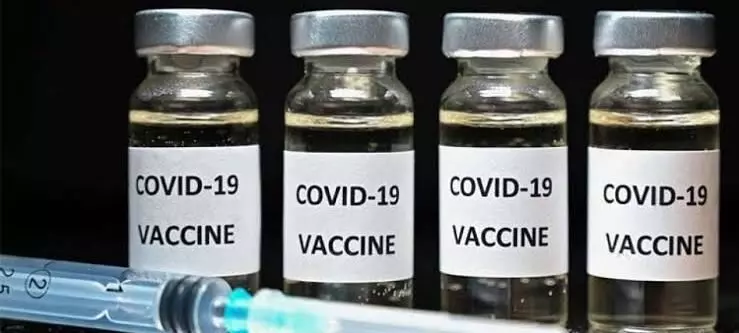
Study finds decline in the efficacy of Covid-19 vaccines
text_fieldsWashington: The Centres for Disease Control and Prevention (CDC) in the United States has released three studies on Wednesday, which found that though the Covid-19 vaccines stood effective against hospitalisations and deaths, the resistance they posed against the pandemic infection has weakened through the past few months, reported The New York Times.
The new findings derived from data of seven states of the country suggested a surge in breakthrough infections and a slight increase in hospitalisations among the vaccinated.
According to experts, the detected decline in vaccine effectiveness could be the result of waning vaccine immunity or the lapse in Covid safety measures like wearing masks or the surge in the highly contagious Delta variant. They are concerned that the rate of decline of vaccine effectiveness might continue for months ahead.
The new studies inferred that the vaccines have effectiveness of roughly 55 per cent against all infections, 80 per cent against symptomatic disease and 90 per cent or higher against hospitalisation.
One of the studies subjected inoculated inmates of nursing homes before and after the advent of the Delta variant to analyse the effectiveness of the vaccines. The study inferred that after the new variant's arrival, effectiveness in preventing infections dropped from 75 per cent to 53 per cent.
The second study analysed data from the New York State when the Delta represented more than 80 per cent of the fresh cases. The study found that vaccine effectiveness in preventing infection in adults declined from 91.7 per cent to 79.8 per cent. But, the vaccines remained effective against hospitalisations. During this period, 20 per cent of the total infections reported in New York were breakthrough infections and 15 per cent of all hospitalisations were vaccinated individuals.
Though there were individuals of all ages in the breakthrough infection case pool, vaccine effectiveness showed a sharp drop of 90 per cent to 74.6 per cent in people aged from 18 to 49. They are least likely to take precautions and most likely to socialise. Even though data from Israel showed that vaccine immunity waned in people aged above 65, data from New York regarding the same age group didn't show much change.
The third study found that vaccines showed 90 per cent effectiveness against hospitalisations in the country but less protection against immunocompromised people.
The vaccines might become less effective than they were during their trials and authorisation since it was before the time of Delta. Also, when more unvaccinated get infected, recover and gain natural immunity, vaccines may lose relative effectiveness. Experts also believe that as more people get vaccinated, the proportions of infected people among vaccinated also increases.
Meanwhile, some experts are sceptical regarding booster shots and suggest against the decision of the third jab for all Americans.
They argue that the study data does not support booster jabs to the general public but immunocompromised individuals. Boosters should be given to prevent hospitalisations, and vaccinating the unvaccinated individuals around the globe is a better step than booster shots.
One of the experts said that it is not clear that a third shot would help individuals who didn't have an immune response during the first two jabs. Also, the recommendation of a third dose might undermine people's confidence in vaccines.
Another expert thinks that a booster shot will boost immunity without question, but the added benefit would be relatively minimal, which could be obtained easily through wearing masks and social distancing. Also, emphasis on the third shot is undermining awareness of the importance of other pandemic-appropriate behaviour among the masses.
Also, vaccinating the vulnerable is a sensible move, but experts opined that those taking care of them should also be vaccinated.
One of the experts said that if prevention is the goal, developing a booster of a nasal spray vaccine would be wise as the nose and throat are the entry gates for the virus.






